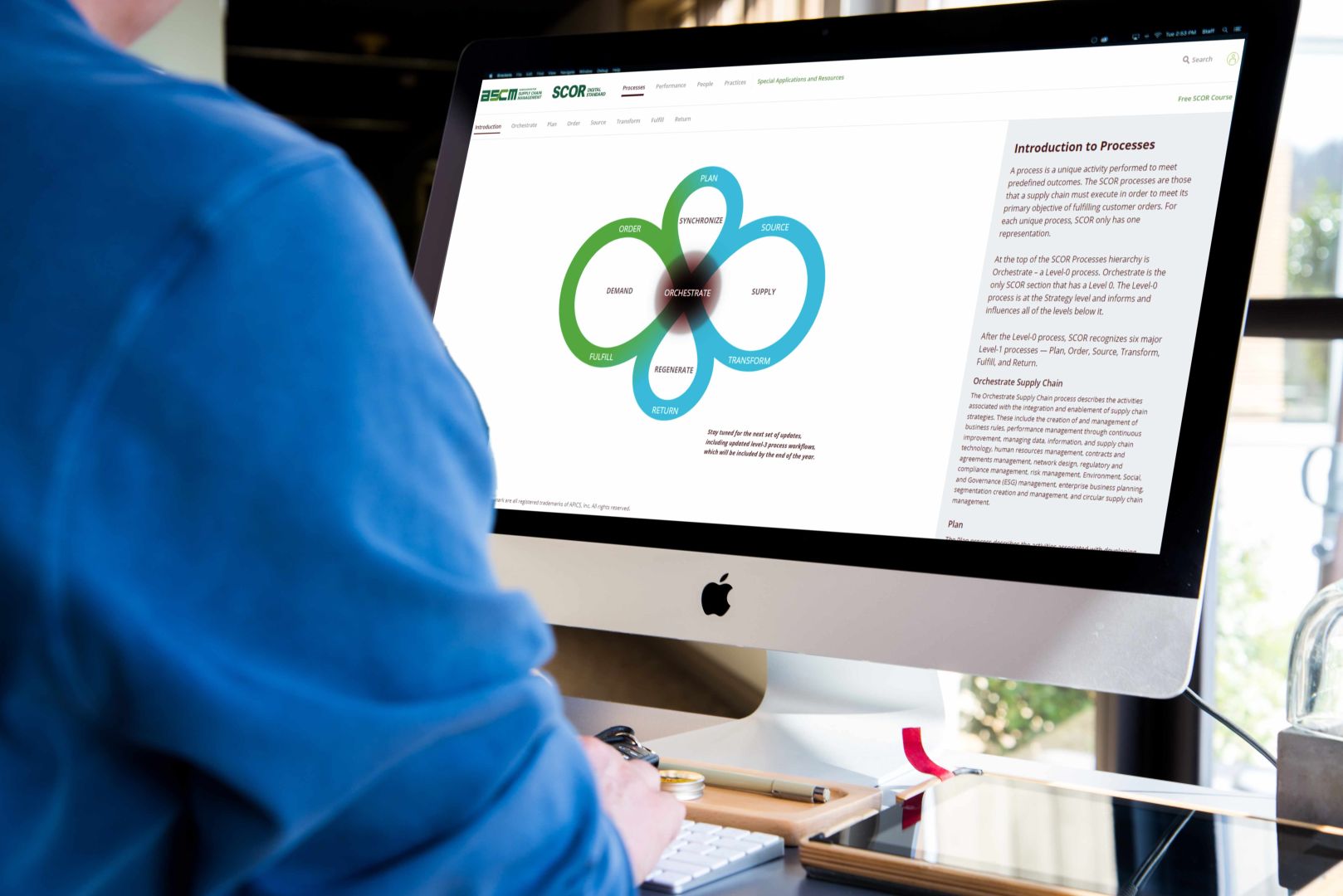SCOR-DS
Supply Chain Operations Reference Model-Digital Standard
This two-day course is about optimizing supply chain performance using the SCOR-DS model. The SCOR framework allows companies to analyze and improve supply chain performance by gaining insight into performance gaps. The main components of the SCOR model are Processes, Performance, Practices, People, and Workflows. These main components are interlinked with each other. During the course, you will learn the relationship between these different components and how to utilize them for performance improvements.
Completion of the SCOR training provides knowledge and skills for applying the SCOR framework. Students can utilize the SCOR tools inside their organization and focus on improving supply chain performance.
To learn more about the SCOR model, read our blog "SCOR model for supply chain excellence."

SCOR is a performance management tool for companies. This training empowers professionals involved in supply chain optimization with the tools they need
Areas SCOR can benefit
Digital
Know what options are available for digitization and choose the most appropriate for a certain process
Reporting
By using standardized metrics, reporting is uniform between supply chain partners
Sustainable
Measuring the consumption of resources per supply chain gives an idea of the sustainable impact
Benchmark
ASCM business members are eligible for a yearly benchmark to compare supply chain performance
Performance
Using the outcomes of the supply chain analysis, you generate a list of possible projects and their outcome
People
Gain insight into the required and available skills and their impact on different processes
Best Practices
Find practices that can be used to improve process performance and prioritize available practices
Speed up improvement
Supply chain improvement can take a long time, using SCOR you better and faster understand the options available

Learning goals
The course is taught with practical hands-on exercises and group discussions. After the two days participants will be able to:
- Understand the origins and objectives of the SCOR framework
- Gain insight into the structure of SCOR DS
- Working with the five components of the SCOR framework: Performance, Processes, Practices, People, and Workflows
- Develop and implement a SCOR improvement program
- Understand the five phases of a typical SCOR improvement program
- Being able to utilize SCOR and start improvement projects
After completing the training, the participants will have practical knowledge that they can use in the supply chain improvement programs their organization wants to start.
Made for supply chain professionals
SCOR training is a highly appreciated skill if you are involved in improving business processes for the following parts of an organization:
- Production
- Operations
- Supply chain
- Purchasing
- Materials
- Inventory
Possible Benefits after the course
After the SCOR training, the organization is able to:
- Work with techniques to measure and manage a global supply chain
- Determine the skills and competencies of your current and future supply chain team, members
- Speed up improvements and performance of the supply chain
- Use benchmarking for assessing the effectiveness of the supply chain (ASCM corporate members only)
Training Approach
The SCOR training is a two-day interactive training designed to encourage active participation. We use a demo company and examples during the course. For in-company courses we use the company's supply chain to lead the examples.
Content & structure
Day 1
Course Introduction, Introduction to SCOR Framework, SCOR DS Business Context, SCOR Performance, part of SCOR Process (Order, Source, Transform)
Day 2
Rest of SCOR Process (Return, Plan, Orchestrate), SCOR Practices, SCOR People, Review of Standards, Assessments, and Transformation Learning Program.
Detailed contents
SCOR DS Framework
- The relationship between performance, processes, best practices, and organizational design.
- Use the SCOR Reference Model for the codification of the Performance, Processes, Practices, People, and workflow metrics within the SCOR framework
Business Context
- Business-specific SCOR Implementation
- Supply chain definition and segmentation
main components
Performance
- Performance attributes for the categories Resilient, Economic, and Sustainable.
- The SCOR metrics levels are customer, sustainability, or internally focused
Processes
- Use Orchestrate processes to give direction and support to the other process categories.
- How to describe the levels of Orchestrate, Plan, Order, Source, Transform, Fulfill and Return processes and how to make them company-specific.
- How process hierarchies are cross-referenced with associated metrics, best practices, and skills.
Practices
- Industry-neutral practices are grouped into practice pillars to identify possible performance improvement areas.
People
- Skills management compliments the process reference, metrics reference, and some practice reference components with an integrated view of supply chain skills.
Compatible Standards included
Related Standards /Assessments
- Digital Capabilities
- Talent
- Sustainability
- Resilience
- GRI (Global Reporting Initiative)
SCOR Transformation Learning Program (TLP)
The basic layout for a SCOR improvement program.
Engage and Define
- Develop supply chain definition/segmentation.
- Scoping of processes and metrics.
- Identification of needed data elements and sources.
- Create the TLP planning process and participants.
Analyze
- Competitive requirements using benchmarking
- Current state process maps are created for Plan, Order, Source, Transform, Fulfill and Return.
- Process disconnects will be assessed and analyzed.
- Selection of practices cross-referenced with processes, performance, and skills.
- Including risk versus returns assessment.
- Talent assessment and performance gap identification.
- Alignment of skills with requirements and people development.
Plan
- Project portfolio identification and to-be state process maps.
- Developing alternative processes
- Project prioritization
Launch
- Create a project roadmap with phased deliverables
Course materials
Participants will receive access to the online course materials
- Detailed information for discussion topics
- All PowerPoint slides during the seminar
- Practice exercises
- Content review questions

Course Schedule
The course is offered during two subsequent days. The program for the two days is as stated below.
Course location
The next opportunities to follow the APICS SCOR-DS course are listed below.
Study load
The duration of the course is two days. The total study load is typically between 30 and 40 hours, including the time for attending the course.
Course fees
The course fee is €1,795. Drinks and lunches during the course days are included. All prices are exclusive of VAT.

Exam
For this training there is no exam for this training.
Certificate
Participants in the course can receive a certificate of completion at the end of the two-day training. This course will apply for 12 certification maintenance points for maintaining an APICS CPIM, CSCP or CLTD certificate.
© Visie Partners B.V. | Privacy policy | General terms and conditions
